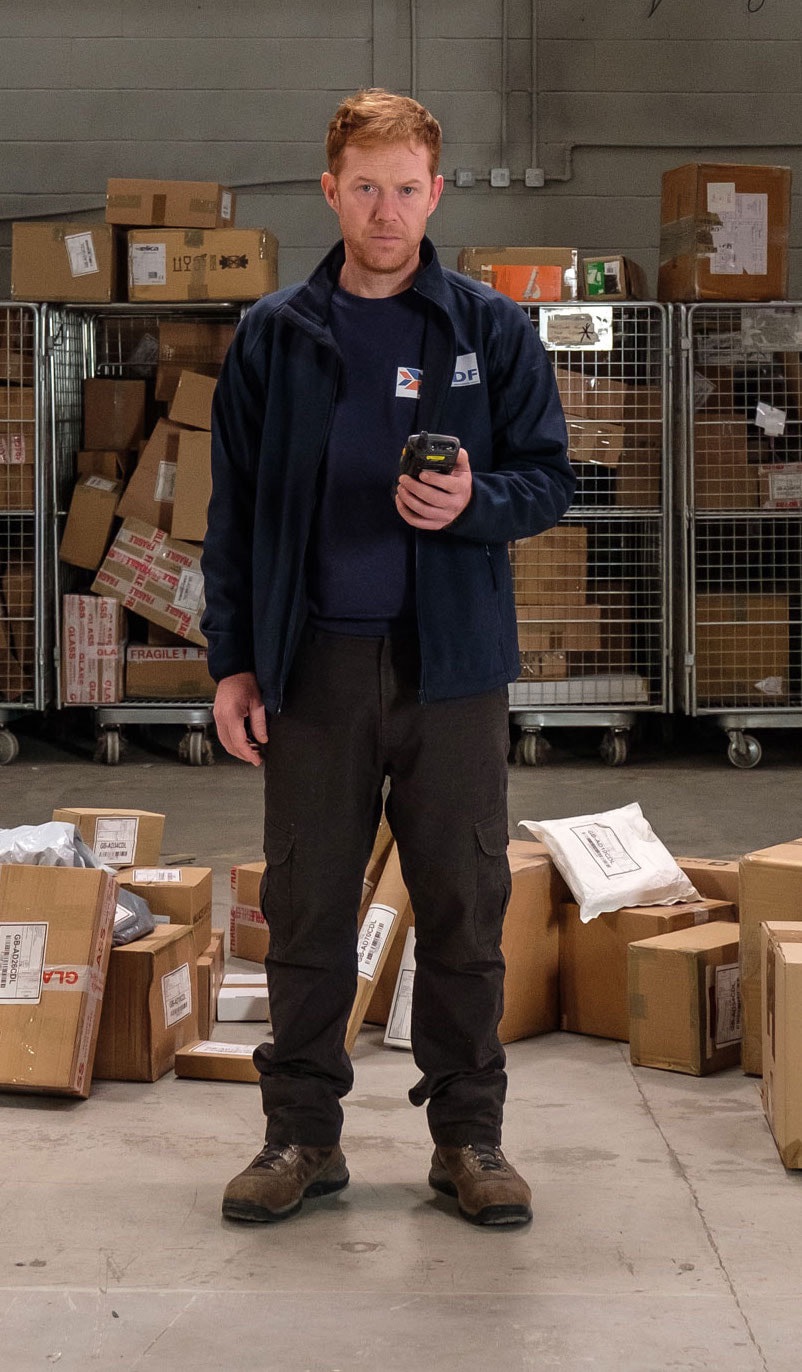Review:
"Sorry We Missed You"

Release Date: March 13, 2020
Rating: R Running Time: 101 minutes To the working class, there is no greater ally than Ken Loach. The British director remains a tireless champion of the overworked and the underpaid more than five decades into his career and with such films as Poor Cow, Kes, Riff-Raff, and Bread and Roses. Loach’s new drama Sorry We Missed You—one of his typically understated but deeply affecting treatise of the exploitation of the working man and woman—is the perfect follow-up to his 2016 I, Daniel Blake, which focused on an unemployed tradeperson’s battle with the British welfare state system. With Sorry We Missed You, Loach skewers with striking efficiency and pinpoint precision a gig economy that seeks to take advantage of, and not empower, the independent contractor. Loach’s working-class heroes in Sorry We Missed You are Ricky and Abby Turner, who are imbued by Kris Hitchen and Debbie Honeywood, respectively, with equal parts resiliency and despair. Ricky goes into business for himself as a delivery driver in a desperate bid to pay off crippling debts and to afford a mortgage for a house. But, as Loach makes clear from the opening scene, Ricky is not really his own boss. He is at the mercy of the strict manager of a parcel delivery service, PDF, and he is required to work day and night without being able to take off any personal time. Ricky’s wife Abby is in a similar situation. She works all hours as a caregiver, and like Ricky, she is always on the clock. Which puts her in a bind. She cannot leave a client in distress but she does not receive pay for the additional time needed to, say, bathe them if they unexpectedly soil themselves. Loach does not put a human face on Abby’s boss. Instead, Loach presents a single phone conversation between Abby and her supervisor that in less than one minute astutely illustrates the complete lack of support and respect that some essential caregivers in both the public and the private sectors receive. Abby’s rule is to treat each client like she would her mother, but the conditions under which she and others like her work is designed to erase the empathy and the human touch caregivers bring to their jobs. In contrast, Loach puts PDF front and center as a corporate villain representative of many, one that views its contractors less than necessary partners in business than drones programmed to hit a certain number of targets in a small window of time. Fail to deliver a package on time, you are fined. Take personal time off, you are fined. Put your life before the job and you are terminated without recourse. If you have tried to plead your case for time off before an apathetic, inflexible boss, then it is impossible to empathize with Ricky as his words fall on deaf ears. As Loach points out, hiring independent contractors is often nothing more than an excuse to strip de facto employees of normal working hours, benefits, and the ability to join a union. Meet the new boss, same as the old boss. Needless to say, Loach has no interest in humanizing Sorry We Missed You’s main antagonist, the PDF supervisor played with stern authority by Ross Brewster. At the same time, Loach refuses to present Ricky as the perfect everyman. Ricky is as flawed as he is devoted to putting food on the dinner table, and this is sadly reflected in Ricky’s deteriorating relationship with his teenage son Seb (Rhys Stone). Who can blame Seb for being disillusioned at such a young age? He sees no hope in his predestined future to follow in his father's footsteps to the point he skips school. The escalating tension between Ricky and Seb informs every minute spent inside Turner’s rented house—it has a severe negative impact on Ricky and Seb’s 11-year-old daughter Liza Jane (Katie Proctor)—and it spills into Ricky’s workday to the point it jeopardizes his business. It is down to Abby to play the peacemaker, especially after a specific incident at home that redefines the way Loach wants us to view Ricky. Loach never attempts to justify Ricky’s actions but to examine its root cause. And, of course, it comes down to money. The lack of money. The need for money. The inability to make enough money. As patient and understanding as Abby is, she is so much more than Ricky’s sounding board. She is as much a provider as Ricky, and Loach ensures Abby’s work and personal problems receive equal time in Sorry We Missed You. The open ending that Loach offers is bound to incite fury. Not just because where it leaves the Turner family but because it is sadly indicative of the obstacles many working people must jump in order to remain gainfully employed or self-employed. It also makes Sorry We Missed You even more relevant and frustrating today. It feeds into the trials and tribulations of two hard-working people who would be considered essential workers during this Coronavirus pandemic. Today, they would be required to put their lives on the line to deliver with the packages we order online or provide care for those with preexisting conditions. Do we think about how they are doing or how they are feeling when they knock on our doors? Not as much as we probably should. Sorry We Missed You prompts us to give these essential workers more thought beyond the 7 p.m. clap. And what will be their reward when all is same and done? That these minimum-wage warriors get to keep their jobs under pre-pandemic pay and work conditions? To this end, if any film demands a sequel set during or after the Coronavirus pandemic, it is Sorry We Missed You. Note: The Violet Crown Austin is presenting virtual screenings of Sorry We Missed You at https://kinonow.com/sorry-we-missed-you-violet-crown-austin Robert Sims Posted: April 17, 2020 Web site: https://zeitgeistfilms.com/film/sorrywemissedyou https://www.facebook.com/SorryWeMissedYou/ |
|
